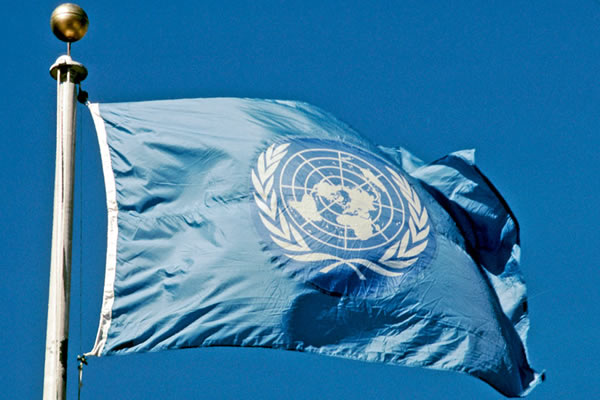United Nations
UN Security Council meeting to focus on LGBTQ, intersex rights
Activists from Colombia, Afghanistan expected to speak at March 20 gathering

A meeting that will focus on the integration of LGBTQ and intersex rights into the U.N. Security Council’s work will take place at the United Nations on March 20.
The U.S. Mission to the U.N. is co-sponsoring the meeting along with Albania, Brazil, Cyprus, the Czech Republic, France, Greece, Japan, Malta, Switzerland, the U.K. and the LGBTI Core Group, a group of U.N. countries that have pledged to support LGBTQ and intersex rights.
U.S. Ambassador to the U.N. Linda Thomas-Greenfield will convene the meeting.
Victor Madrigal-Borloz, the independent U.N. expert on LGBTQ and intersex issues, is expected to provide a briefing on LGBTQ and intersex rights around the world. María Susana Peralta of Colombia Diversa — an LGBTQ and intersex advocacy group in Colombia that participated in talks between the country’s government and the Revolutionary Armed Forces of Colombia that led to an LGBTQ-inclusive peace agreement then-President Juan Manuel Santos and then-FARC Commander Rodrigo “Timochenko” Londoño signed in 2016 — and Afghan LGBT Organization Director Artemis Akbary are also expected to take part.
“At this meeting, we are asking countries to make specific commitments to address LGBTI human rights concerns in the Security Council,” a senior administration official on Thursday told reporters during a conference call. “So, for example, we ourselves will commit to ask questions of U.N. officials regarding human rights violations of LGBTQI persons. We will also commit to raise in our national statements at the Security Council any reports or abuses or other concerns unique to the LGBTI community, and when appropriate, we’ll propose language in Security Council resolutions where there are egregious violations.”
“Our view is that we need to build on best practices,” said another senior administration official. “And we need to embrace a midset in the Security Council where, as the Council addresses the crisis of the day, members consistently ask relevant questions such as: What can the Security Council do to increase protection for LGBTQI+ persons in this conflict? Or how can we expand the women, peace and security agenda to include intersectional identities? Or have we included the perspectives of LGBTQI+ persons in a peacekeeping mission or in a peacebuilding process?”

The Security Council’s first-ever LGBTQ-specific meeting, which focused on the Islanmic State’s persecution of LGBTQ Syrians and Iraqis, took place in 2015. Then-U.S. Ambassador to the U.N. Samantha Power, who is now director of the U.S. Agency for International Development, and then-International Gay and Lesbian Human Rights Commission Executive Director Jessica Stern, who is now the special U.S. envoy for the promotion of LGBTQ and intersex rights, are among those who participated.
The Security Council in June 2016 formally condemned the Pulse nightclub in Orlando, Fla. The U.N. Human Rights Council a few months later appointed Vitit Muntarbhorn as the first independent U.N. expert on LGBTQ and intersex issues. (Madrigal-Borloz succeeded Muntarbhorn in 2018.)
Then-U.S. Ambassador to the U.N. Kelly Knight Craft and then-U.S. Ambassador to Germany Richard Grenell in 2019 hosted an event on the sidelines of a U.N. General Assembly meeting that focused on efforts to decriminalize consensual same-sex sexual relations around the world.
President Joe Biden in 2021 signed a memo that committed the U.S. to promoting LGBTQ and intersex rights abroad as part of the Biden-Harris administration’s overall foreign policy. Outgoing State Department spokesperson Ned Price later told the Washington Blade the decriminalization of consensual same-sex sexual relations is one of the White House’s five priorities as it relates to the promotion of LGBTQ and intersex rights overseas.
Russia one of five permanent Security Council members
The U.S., the U.K., France, China and Russia are the Security Council’s five permanent members. Albania, Brazil, Ecuador, Gabon, Ghana, Japan, Malta, Mozambique, Switzerland and the United Arab Emirates are the 10 non-permanent members.
The United Arab Emirates and Ghana is among the dozens of countries in which consensual same-sex sexual relations remain criminalized.
Gabon and Mozambique over the last decade have formally decriminalized homosexuality. in 2020.
A Ghanaian lawmaker in 2021 introduced a bill that seeks to criminalize LGBTQ and intersex identity and allyship in the country. Russian President Vladimir Putin late last year signed another so-called propaganda law that specifically targets LGBTQ and intersex people.
Russia on Feb. 24, 2022, launched its war against Ukraine.
One of the two senior administration officials who spoke with reporters on Thursday said they do not know if Russia will participate in the meeting. The other official added it is “impossible to have a conversation about the vulnerabilities of LGBTQI people without looking at what’s been happening in Ukraine.”
“I’m sure that’s going to be a question that people are asking,” they said. “I can imagine that it might be referenced in some of the statements by other missions.”
Editor’s note: International News Editor Michael K. Lavers will be at the U.N. on March 20 to cover the meeting.
United Nations
Trump pulls Elise Stefanik’s UN ambassador nomination
Republicans have slim majority in US House of Representatives

President Donald Trump on Thursday withdrew U.S. Rep. Elise Stefanik (R-N.Y.)’s nomination to become the next U.S. ambassador to the U.N.
The Associated Press noted Trump in a Truth Social post said it was “essential to maintain every Republican seat in Congress.”
Republicans currently have a narrow 218-213 majority in the U.S. House of Representatives. Special elections to fill the seats that National Security Adviser Mike Waltz and former U.S. Rep. Matt Gaetz (R-Fla.) vacated when they joined the Trump-Vance administration and resigned respectively will take place on April 1 in Florida.
“Elise Stefanik is truly a great leader and a devoted patriot,” said House Speaker Mike Johnson (R-La.) in a statement. “Today’s selfless decision shows America what those of us who work with her already know. She is deeply devoted to her country and fully committed to see President Trump’s agenda succeed in Congress.”
“It is well known Republicans have a razor-thin House majority, and Elise’s agreement to withdraw her nomination will allow us to keep one of the toughest, most resolute members of our conference in place to help drive forward President Trump’s America First policies,” he added. “There is no doubt she would have served with distinction as our ambassador to the United Nations, but we are grateful for her willingness to sacrifice that position and remain in Congress to help us save the country.”
Stefanik, 40, has represented New York’s 21st Congressional District since 2015. She later became chair of the House Republican Conference.
Stefanik in 2019 voted for the Equality Act, but she opposed it in 2021. Stefanik in 2022 is among the dozens of Republicans who voted for the Respect for Marriage Act that then-President Joe Biden signed.
Stefanik, among other things, has also been outspoken against antisemitism on college campuses.
Trump has not said who he will nominate to become U.N. ambassador. Johnson in his statement said he will “invite her to return to the leadership table” of the House Republican Conference “immediately.”
United Nations
US withdraws from UN LGBTI Core Group
State Department: Decision ‘in line with the president’s recent executive orders’

The U.S. has withdrawn from a group of U.N. member states that have pledged to support LGBTQ and intersex rights.
The U.N. LGBTI Core Group formed in 2008.
Chile and the Netherlands are the current co-chairs. Albania, Argentina, Australia, Belgium, Bolivia, Brazil, Cabo Verde, Canada, Colombia, Costa Rica, Croatia, Denmark, the Dominican Republic, Ecuador, Finland, France, Germany, Honduras, Iceland, Ireland, Israel, Italy, Japan, Luxembourg, Malta, Mexico, Montenegro, Nepal, Peru, New Zealand, North Macedonia, Norway, Portugal, South Africa, Spain, Sweden, Timor Leste, the U.K., and Uruguay are members.
The EU, the U.N. High Commissioner for Human Rights, Human Rights Watch and Outright International are observers.
“The overarching goal of the UN LGBTI Core Group in New York is to work within the United Nations framework on ensuring universal respect for the human rights and fundamental freedoms for all, specifically lesbian, gay bisexual, transgender, and intersex (LGBTI) persons, with a particular focus on protection from violence and discrimination,” states the Core Group’s website.
The Core Group also has three specific objectives:
• Raising awareness about LGBTI issues
• Contributing to multilateral work and negotiations at the United Nations
• Seeking common ground and engaging in a spirit of open, respectful and constructive dialogue and cooperation with UN member states and other stakeholders outside the Core Group.
The promotion of LGBTQ and intersex rights were a cornerstone of the Biden-Harris administration’s foreign policy.
Former first lady Jill Biden last September spoke at a Core Group event that took place on the sidelines of the U.N. General Assembly. Former President Joe Biden was vice president in 2016 when he spoke at a Core Group event that coincided with that year’s U.N. General Assembly.
President Donald Trump since he took office on Jan. 20 has signed a number of executive orders that have targeted the LGBTQ and intersex community. These include the “Defending Women from Gender Ideology Extremism and Restoring Biological Truth to the Federal Government” directive that, among other things, bans the State Department from issuing passports with “X” gender markers.
A directive that Secretary of State Marco Rubio issued bans embassies and other U.S. diplomatic institutions from flying the Pride flag. (Joe Biden in March 2024 signed a government spending bill with a provision that banned Pride flags from flying over U.S. embassies.)
The Associated Press last week reported the Trump-Vance administration has terminated 90 percent of the U.S. Agency for International Development’s foreign aid contracts. Activists with whom the Washington Blade has spoken in previous weeks say the White House’s decision to freeze nearly all U.S. foreign aid spending has been “catastrophic” for the global LGBTQ and intersex rights movement.
A source told the Blade the U.S. withdrew from the Core Group on Feb. 14. A State Department spokesperson on Saturday confirmed the withdrawal, but did not specify the specific date.
“In line with the president’s recent executive orders, we have withdrawn from the U.N. LGBTI Core Group,” said the spokesperson.
United Nations
Elise Stefanik pledges to advance ‘America First’ agenda at UN
Senate Foreign Relations Committee held confirmation hearing on Tuesday

The Senate Foreign Relations Committee on Tuesday held U.S. Rep. Elise Stefanik (R-N.Y.)’s confirmation hearing to become the next U.S. ambassador to the U.N.
The New York Republican did not specifically discuss LGBTQ or intersex rights, but in her opening statement she said President Donald Trump after he nominated her “shared with me that he sees great promise in the United Nations if it focuses on its founding mission of international peace and security.”
“President Trump has long advocated for peace and no wars,” said Stefanik. “He delivered the Abraham Accords (the 2020 agreement in which Bahrain, the United Arab Emirates, and Morocco normalized relations with Israel), the largest step to regional peace in a quarter century.”
“If confirmed, I will work to ensure that our mission to the United Nations serves the interests of the American people and represents President Trump’s America First peace through strength foreign policy,” she added.

Stefanik, 40, has represented New York’s 21st Congressional District since 2015. She later became chair of the House Republican Conference.
Stefanik in 2019 voted for the Equality Act, but she opposed it in 2021. Stefanik in 2022 is among the dozens of Republicans who voted for the Respect for Marriage Act that then-President Joe Biden signed.
Stefanik, among other things, has also been outspoken against antisemitism on college campuses.
U.S. Sen. Dave McCormick (R-Pa.) on Tuesday asked Stefanik about what he described as antisemitism and “anti-Israel bias” at the U.N.
“If you look at the antisemitic rot within the United Nations, there are more resolutions targeting Israel than any other country, any other crisis, combined,” said Stefanik.
“We need to be a voice of moral clarity,” she added.
The hearing took place less than a day after the Senate confirmed Secretary of State Marco Rubio.
-

 District of Columbia2 days ago
District of Columbia2 days agoReenactment of 1965 gay rights protest at White House set for April 17
-

 Maryland3 days ago
Maryland3 days agoFreeState Justice: Transgender activist ‘hijacked’ Moore’s Transgender Day of Visibility event
-

 Hungary2 days ago
Hungary2 days agoHungarian MPs amend constitution to ban public LGBTQ events
-

 Real Estate3 days ago
Real Estate3 days agoNavigating DMV real estate market during political unrest












